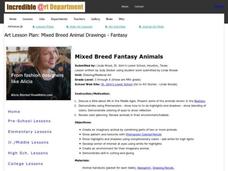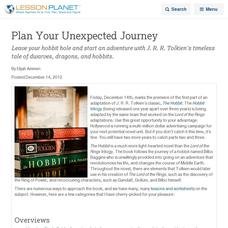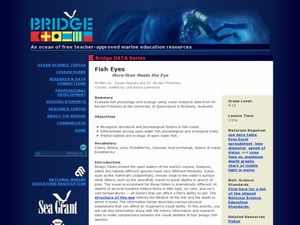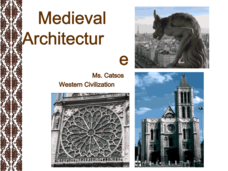Curated OER
Mixed Breed Fantasy Animals
Ever seen a crockapeep or a giraffule? How about a catmel? Elementary school artists are encouraged to let their imaginations roam and create images of imaginary creatures by combining parts of two or more animals,
Curated OER
Plan Your Unexpected Journey
Leave your hobbit hole and start an adventure with J. R. R. Tolkien's timeless tale of dwarves, dragons, and hobbits.
Chicago Botanic Garden
Micro-GEEBITT Climate Activity
A truly hands-on and inquiry based learning activity bridges all the lessons in the series together. Beginning with a discussion on average global temperatures, young meteorologists use real-world data to analyze climate trends in order...
Science 4 Inquiry
Phases of the Moon
The moon takes just over 27 days to orbit around Earth. Young scientists position themselves as the earth as they rotate around the sun and hold the moon. This allows them to observe the patterns and phases of the moon.
Montana State University
Ice in Action
Make your own bite-size glacier! A resource teaches about the formation and melting of ice. Activities include videos, a hands-on activity where your pupils build glaciers, and a photographic analysis to teach individuals the chilling...
Indiana University
World Literature: "One Evening in the Rainy Season" Shi Zhecun
Did you know that modern Chinese literature “grew from the psychoanalytical theory of Sigmund Freud”? Designed for a world literature class, seniors are introduced to “One Evening in the Rainy Season,” Shi Zhecun’s stream of...
Math Solutions
Shape Sorting: Looking for Green!
Young mathematicians rotate, flip, and sort their way to an understanding of the different attributes of geometric figures. Using transparent yellow and blue shapes, children try to match congruent figures together to create...
Curated OER
Fast Fact-Finding
Ever wonder why the sky changes color so often? Readers examine an informational excerpt from John Farndon's How the Earth Works. They underline key points as they read and then answer five response questions. Prompts review main points,...
Colorado State University
How Does the Earth Cool Itself Off?
Where does all the heat go when the sun goes down? An interesting lesson has learners explore this question by monitoring the infrared radiation emitted over time. They learn that hot spots cool more quickly that cooler spots.
California Mathematics Project
Reflections
Reflections are the geometric mirror. Pupils explore this concept as they discover the properties of reflections. They focus on the coordinates of the reflections and look for patterns. This is the third lesson in a seven-part series.
Curated OER
We Must Not Be Enemies: Lincoln's First Inaugural Address
Learners complete a unit of lessons on the historical context and significance of Lincoln's inaugural address. They analyze archival documents, campaign posters, historical photographs, and primary source documents, and listen to songs...
US Department of Energy
Solar Cooking
Who needs a barbecue grill to cook hot dogs when you have the amazing power of the sun at your disposal? Engage young scientists in learning about solar energy with this fun activity that turns a used Pringles can into a solar powered...
North Birmingham Academy
Color Theory
What better way to learn about colors than by coloring? Starting with the primary colors, young artists follow written prompts to shade in various rectangles and a color wheel to show complementary colors, tints and shades, and more.
Sunlight Cal-Tech
Chromatography of Plant Pigments
Through a hands-on activity, an acetone-spinach solution is pre-made and learners use this solution to separate the pigments found in spinach using chromatography. The comprehensive resource includes an analysis and conclusion questions.
Rochester Institute of Technology
Artificial Eye
Scientists in California developed a bionic eye that allows blind people to see edges of objects in black and white and costs $145,000. In the activity, groups of scholars discuss bioengineering, focusing on the human eye. They then...
University of Colorado
Using Spectral Data to Explore Saturn and Titan
Saturn's rings are made of dust, ice, and solid chunks of material. Individuals use spectrographs in this final installment of 22 lessons to determine the atmospheric elements. They analyze spectrums from Titan's atmosphere and Saturn's...
National Endowment for the Humanities
Kennewick Man: Science and Sacred Rights
"Have respect for the dead!" Scholars investigate how science and religion often clash. As they look into the laws of science and the laws of religion, the legal ramifications at the federal level of both play into an argument they...
Curated OER
The Tango
Fourth graders explore the music of Buenos Aires as they hear and then dance the Tango. They practice basic Tango rhythm, learn to sing the song, "Any Turkey can Tango," then practice a few Tango-riffic dance steps with a partner. What a...
Curated OER
Fish Eyes - More than Meets the Eye
Inform your class about the adaptations in fish eyes: cones, lens size, endothermy, and speed of vision. The adaptations are related to diving behavior. Junior marine scientists compare the adaptations of four different fish species to...
Curated OER
Colored Pencil Value Practice
Budding artists discover what color value means with regard to art. They read the definition of color value at the top of the page, choose three different colored pencils, then use the provided spaces to create color values with each. By...
Sargent Art
Picasso and Beyond!
After reviewing the life and art of Pablo Picasso, learners set out to create abstract, cubist, relief portraits. They'll draw, color, paint, and cut out portraits just like the ones Picasso created. The lesson is extremely well written...
Curated OER
Medieval Architecture
While this resource is about architecture, it isn't about art. It demonstrates the differences between Romanesque and Gothic architecture to show changes in the socio-political spectrum of the time. Images and good discussion questions...
EngageNY
Complex Numbers and Transformations
Your learners combine their knowledge of real and imaginary numbers and matrices in an activity containing thirty lessons, two assessments (mid-module and end module), and their corresponding rubrics. Centered on complex numbers and...
Code.org
Check Your Assumptions
Always check your assumptions when interpreting data and data visualizations. That's the take away from this exercise. Class members examine a failed project that looks at search trends to predict flu outbreaks and consider the...
Other popular searches
- Light Reflection
- Light Reflection Refraction
- Light Reflection Mirrors
- Light Reflection by Mirror
- Science Light Reflection
- Light Angle of Reflection
- Light Reflection and Color
- Light Reflection and Mirrors
- Light Reflection Projects
- Light and Reflection
- Light Reflection Internet
- Reflection of Light Waves

























